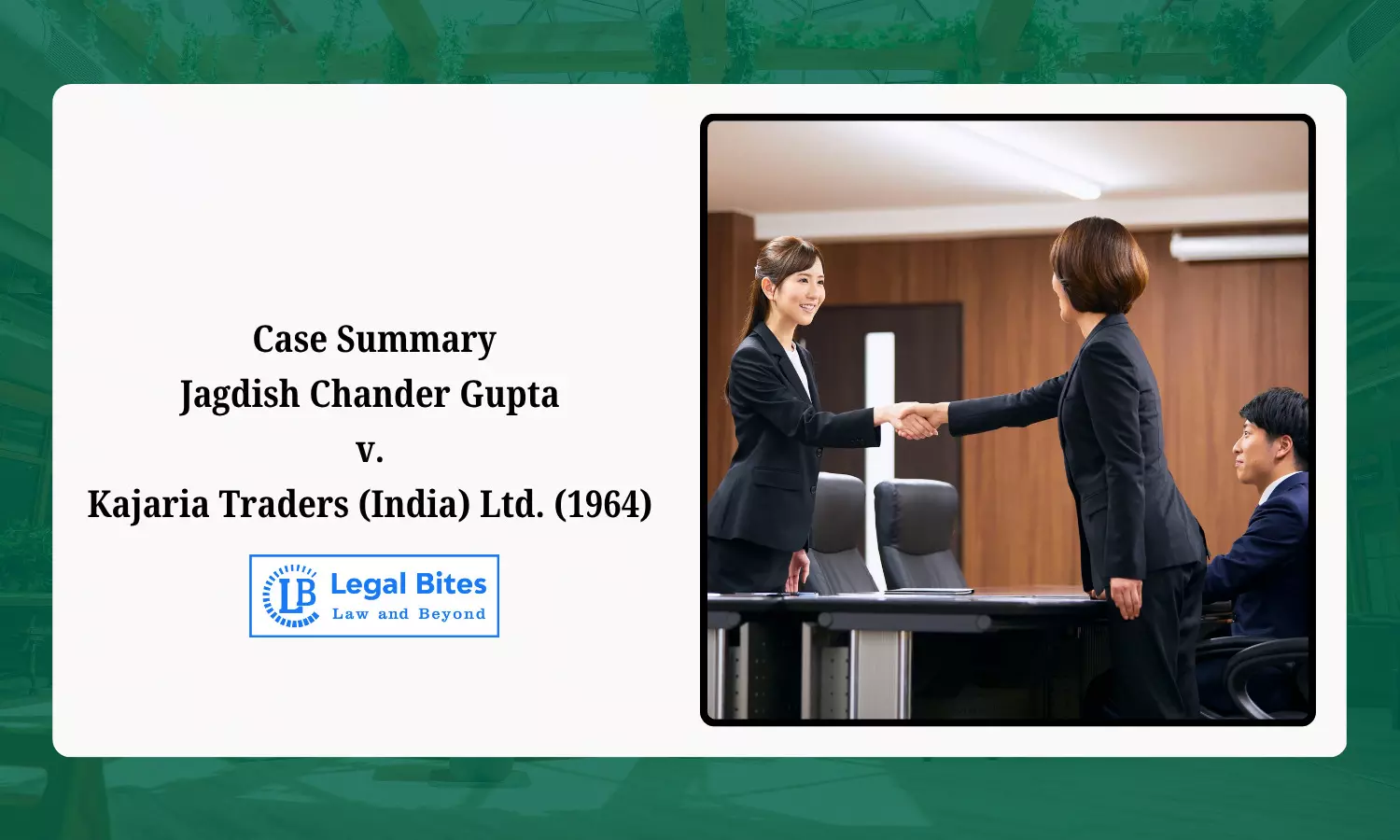
This landmark case concerns the interpretation of Section 69 of the Indian Partnership Act, 1932 in conjunction with the provisions of the Arbitration Act.
Title: Jagdish Chander Gupta v. Kajaria Traders (India) Ltd
Citation: AIR 1964 SC 1882
Bench: M. Hidayatullah (J), K.N. Wanchoo (J), K.C. Das Gupta(J), N. Rajagopala Ayyangar(J)
Date of Judgment: April 29, 1964
Court: Supreme Court of India
Factual Background
Kajaria Traders (India) Ltd. (respondent) and Foreign Import and Export Association, a sole proprietorship owned by Jagdish Chander Gupta (appellant), entered into a partnership agreement in 1955 to export manganese ore. The agreement contained a clause stipulating that any disputes would be referred to arbitration under the Indian Arbitration Act, 1940. The partnership was not registered under the Partnership Act.
A dispute arose, prompting Kajaria Traders to propose an arbitrator. When the appellant failed to respond constructively, the respondent moved the Bombay High Court under Section 8(2) of the Arbitration Act, seeking court appointment of an arbitrator. The appellant opposed this, arguing that the application was barred by Section 69(3) of the Partnership Act due to non-registration of the firm.
Legal Issues
- Whether an application under Section 8(2) of the Arbitration Act amounts to a “proceeding to enforce a right arising from a contract” under Section 69(3) of the Indian Partnership Act, 1932?
- Whether the phrase “other proceeding” in Section 69(3) is to be interpreted ejusdem generis (of the same kind) with “claim of set-off” and thus limited in scope?
- Whether the arbitration clause in the agreement gives rise to an independent statutory right or is merely contractual?
High Court Findings
A Division Bench of the Bombay High Court heard the application. Both judges agreed that the court had power under Section 8(2) of the Arbitration Act to appoint an arbitrator. However, they diverged on whether the bar in Section 69(3) applied.
- Justice Mudholkar held that Section 69(3) barred the application.
- Justice Naik disagreed, arguing that the application was for the enforcement of a right under the Arbitration Act, not merely the partnership agreement.
Due to the divergence, the matter was referred to a third judge, Justice K.T. Desai, who sided with Justice Naik. Consequently, the application was allowed.
Supreme Court Judgment
The Supreme Court allowed the appeal and dismissed the arbitration application with costs. The key observations were:
Arbitration Clause is Part of the Contract: The Court held that the right to seek arbitration flows from the partnership agreement itself, and thus any proceeding to enforce that right is a proceeding “arising from a contract”.
Broad Interpretation of “Other Proceeding”: The Court rejected the argument that “other proceeding” must be interpreted in light of “a claim of set-off” (ejusdem generis). It noted that “a claim of set-off” does not represent a broad or coherent category against which other proceedings could be compared. Set-offs can be legal or equitable and do not form a clear genus. Hence, “other proceeding” must be given its natural, unrestricted meaning.
Enforcement of Contractual Rights: The application under Section 8(2) of the Arbitration Act was held to be a proceeding to enforce a right arising from a contract. Since the firm was unregistered, Section 69(3) prohibited such proceedings.
Rebuttal of High Court Reasoning: The Court found the High Court’s conclusion — that the right arose independently under the Arbitration Act — to be flawed. It emphasised that Section 8(2) could not operate in isolation; it presupposed the existence of a valid arbitration agreement, which in this case was embedded in the unregistered partnership agreement.
Legal Principles Established
Contractual Source of Arbitration Right: Arbitration rights under Section 8(2) of the Arbitration Act are derived from the underlying agreement between parties, not from the statute itself. Hence, enforcement of such rights falls within the ambit of Section 69 of the Partnership Act.
(a) “Other Proceeding” is Broad in Scope: The term “other proceeding” in Section 69(3) includes all proceedings for enforcement of contractual rights, not just defensive claims like set-offs.
(b) Statutory Interpretation: The judgment provides significant clarification on statutory interpretation doctrines:
(i) Ejusdem Generis: It cannot be applied unless the preceding terms form a clear class or genus.
(ii) Noscitur a Sociis: Should not be used to restrict meaning unless there is a strong contextual reason.
Relevance and Impact
This case remains a cornerstone in understanding:
- The limitations placed on unregistered partnerships.
- The dependency of arbitration rights on the enforceability of the underlying contract.
- The cautious approach courts must take in applying restrictive interpretative rules like ejusdem generis.
- It continues to be cited in subsequent decisions to highlight the importance of partnership registration and to explain the scope of proceedings barred under Section 69.
Conclusion
In Jagdish Chander Gupta v. Kajaria Traders, the Supreme Court of India took a firm stand on the legal consequences of non-registration of partnership firms. The Court held that seeking arbitration under an agreement in an unregistered partnership is barred by Section 69(3) of the Partnership Act. The phrase “other proceeding” was given a wide and purposive interpretation to avoid nullifying the object of the statute. The judgment emphasises that parties cannot circumvent statutory restrictions by resorting to arbitration and reinforces the importance of compliance with procedural requirements like firm registration.